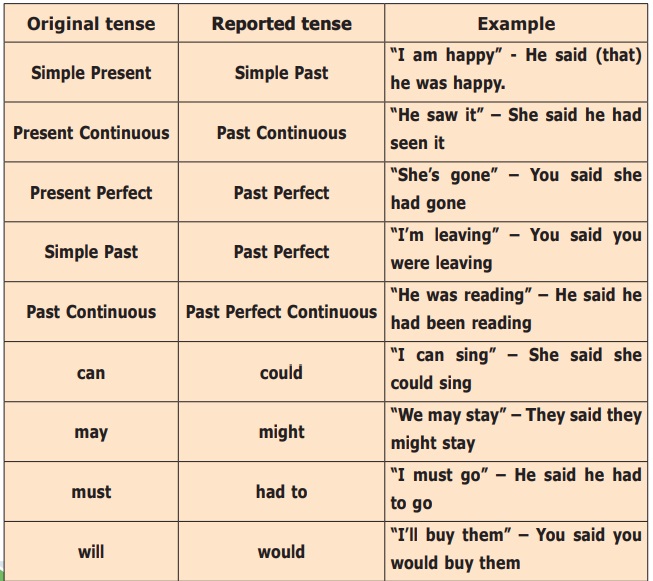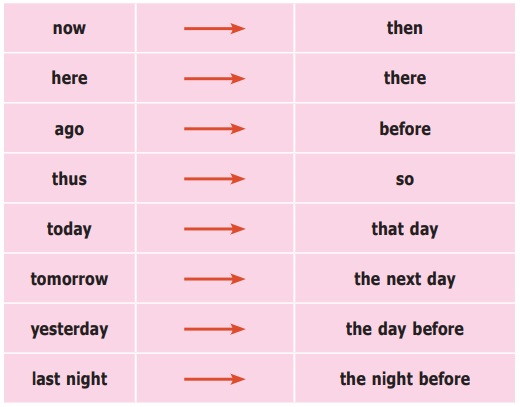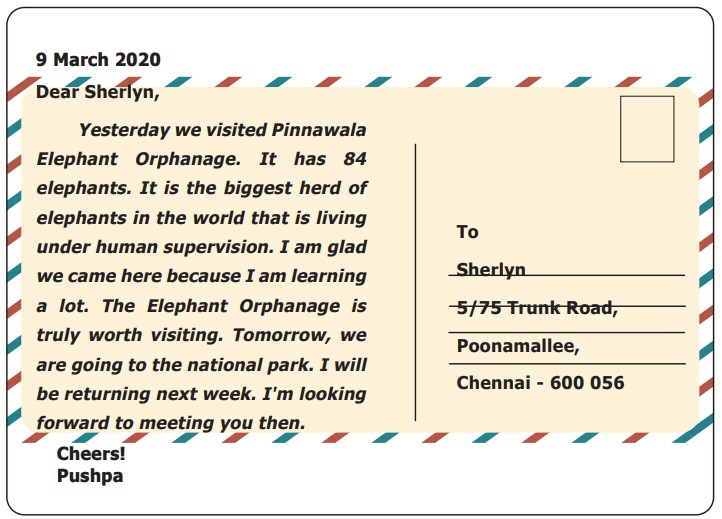REPORTED SPEECH: Indirect Speech, Direct Speech - Grammar | 8th English : Unit 6 : Prose : Friendship
Chapter: 8th English : Unit 6 : Prose : Friendship
Grammar
PICTO GRAMMAR
REPORTED SPEECH

In the above picture Smith
said something to Arun then Arun reports what Smith said to him in the other pictures,
this is known as reported speech. First Arun used the exact words of Smith, it is
direct speech then he said in his own words it is indirect speech. Thus, we can
report a conversation in two types.
The things
that we have to concentrate when we report a speech.
* Reporting verbs (Smith said that
he would come the next day.)
* Conjunctions (Smith said that he
would come the next day.)
* Pronoun (Smith said that he would
come the next day.)
* Tenses (Smith said that he would come the next day.)
* Adverbs (Smith said that he would come the next day.)

Direct - Kaitlyn said. “I am very busy now.”
Indirect - Kaitlyn said that she was very busy then.
* Two verbs commonly used while reporting are told and said.
He said (that) he was cooking dinner.
He told me (that) he was cooking dinner.
Did you notice that tell/told has been used in the sentence which
mentions the listener?
In reported speech we need not mention the listener when we use say/
said.
He said (that) he was cooking. [listener not mentioned)
In direct speech we say: Rahim said to me, 'I will be waiting here.'
In Direct Speech, we use inverted commas to mark off the exact words
of
the speaker. In Indirect Speech we do not.
Rules for changing Direct
Speech into Indirect.

When the reporting or principal verb is in the Past Tense, all Present
tenses of the Direct are changed into the corresponding Past Tenses. Thus:-
(a) A simple present becomes a simple past.
Direct - He said, “I am fine.”
Indirect - He said (that) he was fine.
(b) A present continuous becomes a past continuous.
Direct - She said, “My sister is learning Bharatanatyam.”
Indirect - She said (that) her sister was learning Bharatanatyam.
(c) A present perfect becomes a past perfect.
Direct - He said, “I have
won the match.”
Indirect - He said (that)
he had won the match.
(d) The shall and the will of the Future Tense is changed into should
and would.
(e) The simple past in the
Direct becomes the past perfect in the Indirect.
Direct - She said, “The horse died in the night.”
Indirect
- She said that the horse had died in the night.
(f) The tenses may not change
if the statement is universal truth.
Direct - The teacher said, “The earth goes round the sun.”
Indirect - The teacher said the earth goes round the sun.
(f) If the reporting verb is in the Present Tense, the tenses of
the Direct Speech do not change.
For example, we may rewrite the above examples, putting the reporting
verb in the Present Tense, thus:
He says he is fine.
She has just said her sister is learning Bharatanatyam.
He says he has won the match.
She says the horse died in the night.
(g)
Words expressing nearness
in time or place are generally changed into words expressing distance. Thus:-

Direct - The Prince said, “It gives me great pleasure to be here
this evening.”
Indirect - The Prince said that it gave him great pleasure to be
there that evening.
(h) The changes do not occur if the speech is reported during the same
period or at the same place.
Direct - The Prince said, “It gives me great pleasure to be here
this evening.”
Indirect - The Prince said
that it gives him great pleasure to be here this evening.
Questions
In reporting questions the
Indirect Speech is introduced by some verbs as asked, enquired, whether or if etc.
Direct - He said to me, “What are you doing?”
Indirect - He asked me what I was doing.
Direct - “Where do you live?” asked the stranger.
Indirect - The stranger enquired where I lived.
Direct - He said, “Will you attend the meeting?”
Indirect - He asked them whether they would attend the meeting.
A) Change the following
into Indirect Speech:-
1. “What do you want?” he said to her.
Answer: He asked her what she
wanted.
2. He said, “How's your father?”
Answer: He enquired how his
father was.
3. “Are you coming home with me?” he asked.
Answer: He asked him whether
he was coming home with him.
4. The poor man exclaimed, “Will none of you help me?”
Answer: The poor man asked in
despair whether none of them would help him.
5. “Don't you know the way home?” asked I.
Answer: I asked whether he
knew the way home.
Commands and Requests
In reporting commands and
requests, the Indirect Speech is introduced by some verbs as ordered, requested,
commanded, shouted, urged etc.
Direct - Rama said to Arjun, “Go away.”
Indirect - Rama ordered Arjun to go away.
Direct - He said to him, “Please wait here till I return.”
Indirect - He requested him to wait there till he returned.
Direct - “Call the first witness,” said the judge.
Indirect - The judge commanded them to call the first witness.
Direct - He shouted, “Let me go.”
Indirect - He shouted to them to let him go.
Direct - He said, “Be quiet and listen to my words.”
Indirect
- He urged them to be quiet and listen to his words.
B) Change the following
into Indirect Speech
1.“Bring me a glass of milk,” said the swami to the villagers.
Answer: The swami commanded
the villages to bring him a glass of milk.
2. “Sit down, boys,” said the teacher.
Answer: The teacher ordered
the boys to sit down.
3. “Halt!” shouted the officer to his men.
Answer: The officer shouted to
his men to halt.
4. “Take off your hat,” the king said to the Hatter.
Answer: The king ordered the
Hatter to take off his hat.
5. The teacher said to him, “Do not read so fast.”
Answer: The teacher commanded
him not to read very fast.
6. He said to me, “Wait until I come.”
Answer: He urged me to wait
until he came.
7. “Hurry up,” he said to his servant, “do not waste time.”
Answer: He ordered his servant
to hurry up and not to waste time.
8. “Run away, children,” said their mother.
Answer: Their mother urged the
children to run away.
9. He said, “Daughter, take my golden jug, and fetch me some water
from the Well.”
Answer: He requested his
daughter to take his golden jug and fetch him some water from the well.
10. “Go down to the bazaar. Bring me some oil and a lump of ice.”
ordered his master.
Answer: His master ordered him
to go down to the bazaar and bring him some oil and a lump of ice.
D) What were the actual words used in each instance below? The sentences
containing the actual words are jumpled in the box. Write them out in the same order
as the actual words.
1. Punitha asked Pushpa what she was reading.
2. Pushpa told her that he was reading Robinson Crusoe.
3. Punitha asked her what it was all about.
4. Pushpa said it was about a man wrecked on an island.
5. Punitha then asked her friend who gave her the book.
6. Pushpa answered that her uncle gave it to her at Christmas.
7. Finally Punitha inquired if she could borrow it.
8. Pushpa replied that she would certainly lend it to her.
(a) "May I borrow it?"
inquired Punitha.
(b) "What are you reading,
Pushpa?" asked Punitha.
(c)
"It is about a man wrecked on an island," Pushpa said.
(d) "Of course I will
lend it to you," replied Pushpa.
(e) "Uncle gave it to
me at Christmas,' answered Pushpa.
(f)"What is it all about?"
Punitha asked.
(g)"I am reading Robinson
Crusoe, Pushpa told her.
(h)"Who gave you the
book, Pushpa?" Punitha then asked.
Answer:
1. (b) “What are you
reading, Pushpa?” asked Punitha.
2. (g) “I am reading
Robinson Crusoe”, Pushpa told her.
3. (f) “What is it all
about?” Punitha asked.
4. (c) “It is about a
man wrecked on an island,” Pushpa said.
5. (h) “Who gave you
the book, Pushpa?” Punitha then asked.
6. (e) “Uncle gave it
to me at Christmas,’ answered Pushpa.
7. (a) “May I borrow
it?” inquired Punitha.
8. (d) “Of course I
will lend it to you,” replied Pushpa.
E. Change the following into Direct Speech:-
1. Nevin
asked his father when the next letter would come.
Answer: Nevin asked his
father, “When will the next letter come?”
2. I wrote that I would visit him next day.
Answer: I wrote, “I will visit
you tomorrow”.
3. I told them to be quiet.
Answer: I said to them, “Be
quiet”.
4. Lakshan asked me if I had anything to say.
Answer: He asked me, “Do you
have anything to say”.
5. An old mouse asked who would bell the cat.
Answer: An old mouse asked,
“Who will bell the cat?”
6. Mervin said that he wanted to be a soldier.
Answer: Mervin said, “I want
to be a soldier”.
7. Ebin asked me what I wanted.
Answer: Ebin asked me,
"What do you want?"
8. Bhagya said that she had seen that picture.
Answer: Bhagya said, "I
have seen this picture”.
9. The stranger asked Nasrin where she lived.
Answer: The stranger asked
Nasrin, "Where do you live?"
10. I asked Mary if she would lend me a pencil.
Answer: I asked Mary,
"Will you lend me a pencil?”:
F. Sherlyn receives a postcard from her friend Pushpa who is holidaying
in Sri Lanka. She calls her friend Galen and tells him what Pushpa has written.
Help her by filling in the blanks, using reported speech.

Hello, Galen Today I received a postcard from Pushpa. Remember I had told you that She has gone to Sri Lanka on a holiday? Well, she has written from Colombo. She has written that she had visited Pinnawala Elephant Orphanage. It had 84 elephants. She said that it is the biggest herd of elephants in the world that is living under human supervision. She also added that she she was glad that they had come there because she was learning a lot . The Elephant Orphanage was truly worth visiting. She said that next day, they are going to the national park. She would be returning next week and added that she was looking forward to meeting me then.
GRAMMAR ADDITIONAL
REPORTED SPEECH
A. Change the
following into indirect speech :
1. Ramu says, “I am busy”.
Answer: Ramu says that he is
busy.
2. Suresh said, “I like dancing”.
Answer: Suresh said that he
liked dancing.
3. He said, “I am going to the
cinema”.
Answer: He said that he was
going to the cinema.
4. Ravi said, “I have bought a
cycle”.
Answer: Ravi said that he had
bought a cycle.
5. Ram said, “Visu came at night”.
Answer: Ram said that Visu had
come at night.
6. He said, “Honesty is the best
policy”.
Answer: He said that honesty
is the best policy.
7. She said, “I have done my
homework”.
Answer: She said that she had
done her homework.
8. He says, “I am happy”.
Answer: He says that he is
happy.
9. The teacher said, “Hari will
definitely pass”.
Answer: The teacher said that
Hari would definitely pass.
10. Raju said, “I shall be here this
evening”.
Answer: Raju said that he
would be there that evening.
B. Change the
following into direct speech :
1. The teacher ordered the boys to
leave that place.
Answer: The teacher said to
the boys, “Leave this place”.
2. I requested him to give me a
glass of water.
Answer: I said to him, “Please
give me a glass of water”.
3. The captain ordered the soldiers
to stand at ease.
Answer: The captain said,
“Stand at ease”.
4. My brother said that he might go
to Kolkata.
Answer: My brother said, “I
may go to Kolkata”.
5. He said that the earth moves
around the sun.
Answer: He said, “The earth
moves around the sun”.
6. Ravi asked Ganesh when he was
going to the library.
Answer: Ravi said to Ganesh,
“When are you going to the library?”.
7. The policeman ordered the boy to
show him his licence.
Answer: The policeman said to
the boy, “Show me your licence”.
8. She told him that she was going
to the market then.
Answer: She said to him, “I am
going to the market now”
9. He said that he was buying a cell
phone that day.
Answer: He said, “I am buying
a cell phone today”.
10. He asked who I was.
Answer: He said, “Who are
you?”.
C. Change the following into
Indirect Speech :
1. He said, “My God! I am ruined.”
Answer: He exclaimed sadly
that he was ruined.
2. He said, “Alas! our foes are too
strong.”
Answer: He exclaimed
sorrowfully that their foes were too strong.
3. “How smart you are!” she said.
Answer: She exclaimed that he
was very smart.
4. He said. “Oh ! that’s a
nuisance.”
Answer: He exclaimed with
disgust that it was a nuisance.
5. He said, “What a pity you did not
come!”
Answer: He exclaimed with
sorrow that he did not come.
D. Convert the
following into indirect speech.
a. Sharun said to me,
Are you coming to school tomorrow?’
Answer: Sharun asked me if I
am coming to school, the next day.
b. “We must visit the
historical buildings of Delhi since we are here,’ said Ashok.
Answer: Ashok said that they
had to visit the historical building of Delhi, since they were there.
c. ‘Have you read The
Wind in the Willows?’ asked Amutha.
Answer: Amutha asked whether
he had read ‘The Wind in the Willows’.
d. Teacher said to us,
‘You must conduct the experiment very carefully.’
Answer: The teacher told us
that we had to conduct the experiment very carefully.
e. ‘Wow! That is great
news!’ said Tejeswar.
Answer: Tejaswar exclaimed
happily that it was a great news.
Related Topics